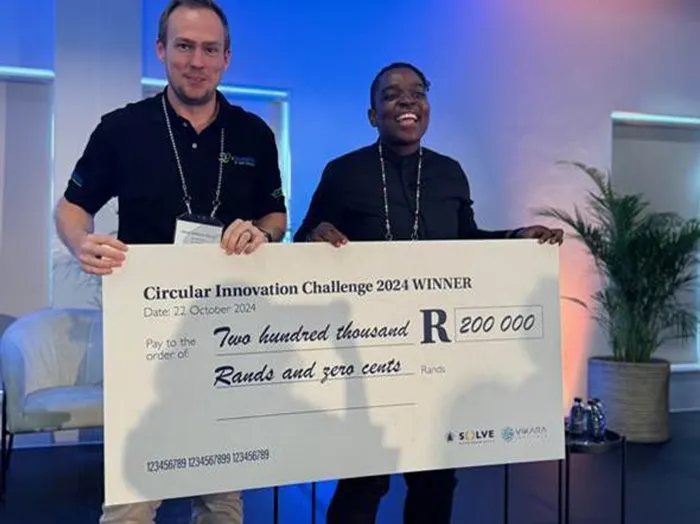Circular Challenge winner announced

eWaste Africa were announced the winners of the Circular Innovation Challenge 2024. Pictured are chief technology officer Mark Williams-Wyn and Cape regional manager, Mmakoma Komape.
The NGO SOLVE@Waterfront, which supports innovative solutions for challenges in South Africa, has announced the winner of its Circular Innovation Challenge for 2024.
Among 54 entries for this year’s challenge, eWaste Africa, a company based in Martizburg, took first prize for recycling defunct PV panels that cannot go to landfill because its hazardous waste, and because 90% of each panel is laminate glass that cannot be recycled.
Circularity is about the practices which lead to sustainability, including reusing raw materials, refurbishing used products, or recycling old materials.
The competition sought entries of innovative products, technologies and/or services which encourage the move from a linear to a circular economy - in which everyday items such as textiles and plastics, food production and construction materials, and by products of living such as waste and black water, are produced, consumed, and/or managed in a circular and regenerative manner.
eWaste Africa has developed a process to address this growing problem, recovering the metals for recycling, and turning the otherwise unusable glass into green interlocking pavers.
Mark Williams-Wynn, chief technology officer at eWaste Africa, which had recently opened offices in Cape Town, said glass from e-waste had always been problematic.
He said the company had made use of several options to reuse the glass that they had recovered from lighting waste and solar panels over the years, including in the manufacture of concrete blocks.
However, he said this had always been through third-party service providers and eWaste Africa did not have any control over the use of the glass.
“We started working on our internal process to manufacture these green interlocking pavers using the glass that is recovered from the e-waste ourselves in November 2022.
“We commissioned our plant in June 2023 and, to date, have processed about 20 000 modules. These modules have come to us from solar farms and companies and are being replaced because they are faulty or damaged.”
He said to make the pavers, the PV modules are first disassembled to remove any valuable metals from them, including the aluminium frame and the copper wiring to the junction box.
Thereafter, the laminate glass is milled and used to replace up to 50% of the virgin materials, such as sand and stone, in the interlocking pavers.
The pavers are manufactured using a wet process and then take up to 30 days to reach full strength, at which point they can easily compete with traditional concrete pavers.
He said the biggest advantage is that they are manufactured using recycled materials, thereby reducing their environmental footprint. “We are in the process of applying for eco-certification, which will then make them perfect for use around green-star-rated buildings.”
eWaste Africa won R200 000 and a basketful of the kind of resources that can transform a budding enterprise: a training programme of their choosing to address any specific needs the business may have; mentorship and access to business contacts; and exposure to other businesses and potential customers through testing their concepts at the Waterfront.
David Green, CEO of the V&A Waterfront, said sustainability is one of their strategic pillars, and within that pillar, they hold the goal of being a leading example of circularity in action. “It was inspiring that there was great breadth and depth among the circularity innovations put forward for this challenge, and we’d encourage all these enterprises to keep up the good work. There’s still a long way to go.”
Solve director, Heather Parker, said the challenge had been a real inspiration. “The pressing issues of overproduction, over-consumption and a throwaway society don’t go away, but knowing how many people are doing really good, really effective work, and coming up with innovative solutions, makes us so hopeful.
“From community level to systems level, we get excited about the many different kinds of impact we’re seeing and hearing about.”
Margie Brand of Vikāra Institute, who is the co-sponsor of the challenge, said: “Circularity is a critically important way to think about how businesses can both improve efficiencies and better manage climate change drivers.”
Mr Williams-Wynn said as there were so many people doing so many great things in the circularity space in South Africa, he did not think that they would win with our “boring” interlocking pavers. “However, I am glad that the bigger picture of solving a pending crisis of mountains of solar waste was recognised beyond just a simple paver.”
He said winning the Circular Challenge was a team effort and something that he wanted to celebrate together. “Unfortunately, as our main facilities are in Johannesburg and Pietermaritzburg - the Cape Town facility had only just opened - I only had one team member to celebrate with, so I went for a run up Lion's Head to celebrate instead.”
He said the best way that people can support innovation is through exposure.
“Yes, there is always a need for funding. And yes, there are so many challenges. But if an innovative product or service can get exposure, it solves the problem of the need for funding and helps to overcome the other challenges that may be faced.
“Recognition through events such as the Circular Awards is critical. Any of the finalists were deserving winners and hopefully all of them will benefit from the exposure that the Circular Innovation Awards will bring.”
Related Topics: